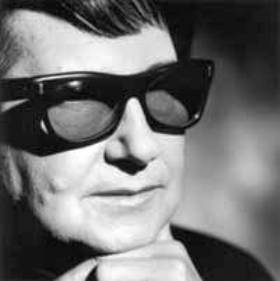Roy Orbison

Elvis Presley said he was his favorite singer; Bruce Springsteen said he wished he could have had a voice like his. Roy Orbison was an original -- a romantic rockaballadeer with a quavering, operatic, ranchero tenor voice.
Orbison was born on this day in 1936 in Vernon, Texas. He grew up as an awkward kid with thick glasses (later replaced by his trademark dark shades), immersing himself in his music and learning the social lessons which he would use to create the pop icon persona of the heartbroken outsider. After touring around west Texas and singing on radio shows, he cut a straight rockabilly single, "Ooby Dooby" for Sam Phillips at Sun Records which became a minor hit in 1956.
He was capable as a rockabilly cat, but he wasn't really finding his stride, and it was easy to get lost in a Sun Studio stable inhabited by Elvis, Johnny Cash, Jerry Lee Lewis and Carl Perkins, so he left Sun to devote himself to songwriting (scoring one early hit with "Claudette," recorded by the Everly Brothers). Signing with Monument, he finally found his groove, launching his real career with "Only the Lonely" (1960, a #2 hit), a monologue of romantic despair with a note of stoic hope which matched perfectly with his poignant, tremulous sighs and whispers. Other hits in this vein would follow ("Running Scared," 1961, #1; "Crying," 1961, #2; "In Dreams," 1963, #7), as well as a few in a rougher, more sensual and swaggering vein ("Dream Baby," 1962; "Candy Man," 1961; and his biggest hit, "Oh, Pretty Woman," 1964, #1).
In 1963, he headlined a European tour with the Beatles, and when they came to the U.S., they asked him to manage their first U.S. tour, but his schedule forced him to turn down the potentially lucrative adventure. Ironically, the British invasion of U.S. rock and roll turned down the heat on Orbison's career, and in the late 60s he suffered personal setbacks (losing his wife in a motorcycle accident, losing his home in a fire).
The huge comeback came, however, when "In Dreams" was featured in a particularly bizarre moment of David Lynch's bizarre Blue Velvet (1986). Shortly afterward, he signed on for a lark with old friends and new collaborators George Harrison, Bob Dylan, Tom Petty and ELO-refugee Jeff Lynne on the Traveling Wilburys recording project, which produced a few easy-going pop hits and renewed exposure for Orbison. He was enjoying tributes as an elder statesman of rock and the expected release of a new album, Mystery Girl (1989), when he died of a heart attack at age 52 on December 6, 1988 in Madison, Tennessee.
Categories: Classic-Pop-Music





3 Comments:
One of Roy's last shows was caught on film with lots of guest stars: "Roy Orbison: A Black & White Night" is nothing less than brilliant. Elvis Costello, Bruce Springsteen, Tom Waits, Bonnie Raitt, k.d. lang, Jackson Browne, et.al. seem to have more fun here than at their own shows {esp. Bruce ("Roy Orbison signing for the lonely")}. Check it out if you haven't already.
I know it well. I gave the tape of it to my then 80-something-year old grandmother for Christmas one year, and she was thrilled with it. When Roy died, though, she got very concerned. "What are all those other people going to do without him?" she asked. I assured her they didn't have to go back to their day jobs.
As to the tragedies in the 60's, two young sons died in that house fire, also.
Post a Comment
Subscribe to Post Comments [Atom]
<< Home